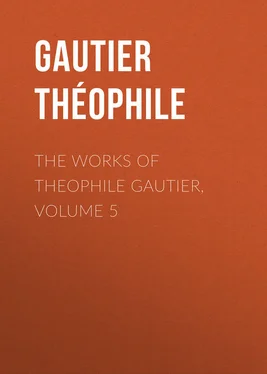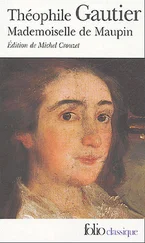Théophile Gautier - The Works of Theophile Gautier, Volume 5
Здесь есть возможность читать онлайн «Théophile Gautier - The Works of Theophile Gautier, Volume 5» — ознакомительный отрывок электронной книги совершенно бесплатно, а после прочтения отрывка купить полную версию. В некоторых случаях можно слушать аудио, скачать через торрент в формате fb2 и присутствует краткое содержание. Жанр: foreign_antique, foreign_prose, на английском языке. Описание произведения, (предисловие) а так же отзывы посетителей доступны на портале библиотеки ЛибКат.
- Название:The Works of Theophile Gautier, Volume 5
- Автор:
- Жанр:
- Год:неизвестен
- ISBN:нет данных
- Рейтинг книги:3 / 5. Голосов: 1
-
Избранное:Добавить в избранное
- Отзывы:
-
Ваша оценка:
- 60
- 1
- 2
- 3
- 4
- 5
The Works of Theophile Gautier, Volume 5: краткое содержание, описание и аннотация
Предлагаем к чтению аннотацию, описание, краткое содержание или предисловие (зависит от того, что написал сам автор книги «The Works of Theophile Gautier, Volume 5»). Если вы не нашли необходимую информацию о книге — напишите в комментариях, мы постараемся отыскать её.
The Works of Theophile Gautier, Volume 5 — читать онлайн ознакомительный отрывок
Ниже представлен текст книги, разбитый по страницам. Система сохранения места последней прочитанной страницы, позволяет с удобством читать онлайн бесплатно книгу «The Works of Theophile Gautier, Volume 5», без необходимости каждый раз заново искать на чём Вы остановились. Поставьте закладку, и сможете в любой момент перейти на страницу, на которой закончили чтение.
Интервал:
Закладка:
As a general rule mummies which have been filled with bitumen and natron resemble black simulacra carved in ebony; corruption cannot attack them, but the appearance of life is wholly lacking; the bodies have not returned to the dust whence they came, but they have been petrified in a hideous shape, which one cannot contemplate without disgust and terror. In this case, the body, carefully prepared by surer, longer, and more costly processes, had preserved the elasticity of the flesh, the grain of the skin, and almost its natural colour. The skin, of a light brown, had the golden tint of a new Florentine bronze, and the amber, warm tone which is admired in the paintings of Giorgione and Titian covered with a smoky varnish, was not very different from what must have been the complexion of the young Egyptian during her lifetime. She seemed to be asleep rather than dead. The eyelids, still fringed with their long lashes, allowed eyes lustrous with the humid gleam of life to shine between their lines of antimony. One could have sworn they were about to shake off, as a light dream, their sleep of thirty centuries. The nose, delicate and fine, preserved its pure outline; no depression deformed the cheeks, which were as round as the side of a vase; the mouth, coloured with a faint blush, had preserved its imperceptible lines, and on the lips, voluptuously moulded, fluttered a melancholy and mysterious smile, full of gentleness, sadness, and charm, – that tender and resigned smile which pouts so prettily the lips of the adorable heads which surmount the Canopean vases in the Louvre.
Around the forehead, low and smooth in accordance with the laws of antique beauty, was massed jet-black hair divided and plaited into a multitude of fine tresses which fell on either shoulder. Twenty golden pins stuck into the tresses, like flowers in a ball head-dress, studded with brilliant points the thick dark hair which might have been thought artificial, so abundant was it. Two great earrings, round discs resembling small bucklers, shimmered with yellow light by the side of the brown cheeks. A magnificent necklace, composed of three rows of divinities and amulets in gold and precious stones, encircled the neck of the coquettish mummy, and lower down upon her breast hung two other collars, the pearl, gold, lapis-lazuli, and cornelian rosettes of which alternated symmetrically with the most perfect taste. A girdle of nearly the same design enclosed her waist with a belt of gold and gems. A double bracelet of gold and cornelian beads adorned her left wrist, and on the index of the left hand shone a very small scarabæus of golden cloisonné enamel, which formed a seal ring and was held by a gold thread most marvellously plaited.
Strange were the sensations of the two men as they found themselves face to face with a human being who had lived in the days when history was yet young and was collecting the stories told by tradition; face to face with a body contemporary with Moses, which yet preserved the exquisite form of youth; as they touched the gentle little hand impregnated with perfumes, which a Pharaoh perhaps had kissed; as they fingered the hair, more durable than empire, more solid than granite monuments. At the sight of the lovely dead girl, the young nobleman felt the retrospective desire often inspired by the sight of a statue or a painting representing a woman of past days famous for her beauty. It seemed to him that he would have loved, had he lived three thousand years earlier, that beauty which nothingness had refused to destroy; and the sympathetic thought perhaps reached the restless soul that fluttered above its profaned frame.
Far less poetic than the young nobleman, Dr. Rumphius was making the inventory of the gems, without, however, taking them off; for Evandale had ordered that the mummy should not be deprived of this last frail consolation. To take away gems from a woman, even dead, is to kill her a second time. Suddenly a papyrus roll concealed between the side and arm of the mummy caught the doctor's eye.
"Oh!" said he, "this is no doubt a copy of the funeral ritual placed in the inner coffin and written with more or less care according to the wealth and rank of the person."
He unrolled the delicate band with infinite precautions. As soon as the first lines showed, he exhibited surprise, for he did not recognise the ordinary figures and signs of the ritual. In vain he sought in the usual places for the vignettes representing the funeral, which serve as a frontispiece to such papyri, nor did he find the Litany of the Hundred Names of Osiris, nor the soul's passport, nor the petition to the gods of Amenti. Drawings of a peculiar kind illustrated entirely different scenes connected with human life, and not with the voyage of the shade to the world beyond. Chapters and paragraphs seemed to be indicated by characters written in red, evidently for the purpose of distinguishing them from the remainder of the text, which was in black, and of calling the attention of the reader to interesting points. An inscription placed at the head appeared to contain the title of the work, and the name of the grammat who had written or copied it, – so much, at least, did the sagacious intuition of the doctor make out at the first glance.
"Undoubtedly, my lord, we have robbed Master Argyropoulos," said he to Evandale, as he pointed out the differences between the papyrus and the usual ritual. "This is the first time that an Egyptian manuscript has been found to contain anything else than hieratic formulæ. I am bound to decipher it, even if it costs me my sight, even if my beard grows thrice around my desk. Yes, I shall ferret out your secret, mysterious Egypt! Yes, I shall learn your story, you lovely dead; for that papyrus pressed close to your heart by your lovely arm surely contains it. And I shall be covered with glory, become the equal of Champollion, and make Lepsius die of jealousy."
The nobleman and the doctor returned to Europe. The mummy, wrapped up again in all its bandages and replaced within its three cases, rests within Lord Evandale's park in Lincolnshire, in the basalt sarcophagus which he brought at great expense from Biban el Molûk and which he did not give to the British Museum. Sometimes Lord Evandale leans upon the sarcophagus, sinks into a deep reverie, and sighs.
After three years of unflagging application, Dr. Rumphius succeeded in deciphering the mysterious papyrus, save in some damaged parts, and in others which contained unknown signs. And it is his translation into Latin – which we have turned into French – that you are about to read, under the name, "The Romance of a Mummy."
I
Oph (that is the name of the city which antiquity called Thebes of the Hundred Gates, or Diospolis Magna), seemed asleep under the burning beams of the blazing sun. It was noon. A white light fell from the pale sky upon the baked earth; the sand, shimmering and scintillating, shone like burnished metal; shadows there were none, save a narrow, bluish line at the foot of buildings, like the inky line with which an architect draws upon papyrus; the houses, whose walls sloped well inwards, glowed like bricks in an oven; every door was closed, and no one showed at the windows, which were closed with blinds of reeds.
At the end of the deserted streets and above the terraces stood out in the hot, transparent air the tips of obelisks, the tops of pylons, the entablatures of palaces and temples, whose capitals, formed of human faces or lotus flowers, showed partially, breaking the horizontal lines of the roofs and rising like reefs amid the mass of private buildings. Here and there above a garden wall shot up the scaly trunk of a palm tree ending in a plume of leaves, not one of which stirred, for never a breath blew. Acacias, mimosas, and Pharaoh fig-trees formed a cascade of foliage that cast a narrow blue shadow upon the dazzling brilliancy of the ground. These green spots refreshed and enlivened the solemn aridity of the picture, which but for them would have been that of a dead city.
Читать дальшеИнтервал:
Закладка:
Похожие книги на «The Works of Theophile Gautier, Volume 5»
Представляем Вашему вниманию похожие книги на «The Works of Theophile Gautier, Volume 5» списком для выбора. Мы отобрали схожую по названию и смыслу литературу в надежде предоставить читателям больше вариантов отыскать новые, интересные, ещё непрочитанные произведения.
Обсуждение, отзывы о книге «The Works of Theophile Gautier, Volume 5» и просто собственные мнения читателей. Оставьте ваши комментарии, напишите, что Вы думаете о произведении, его смысле или главных героях. Укажите что конкретно понравилось, а что нет, и почему Вы так считаете.












